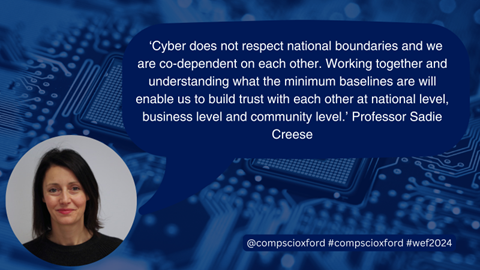Professor Sadie Creese speaks at World Economic Forum on cybersecurity
Posted: 22nd January 2024
Department of Computer Science Professor of Cybersecurity, Sadie Creese, joined a panel of experts at the World Economic Forum (WEF) in Davos to discuss cybersecurity in the face of prevailing global geopolitical and economic turbulence.
Sadie spoke at the session entitled ‘How Can Cyber Defenders Win?’ alongside Samir Saran, President of the Observer Research Foundation, Jürgen Stock, Secretary-General of Interpol, Debjani Ghosh, President of NASSCOM, John Doyle, President and CEO at Marsh McLennan, and Gary Steele, President and CEO at Splunk.

The panel discussed the role of leadership in navigating the risks posed to the cyber ecosystem by an unstable global arena, advances in transformative technologies, such as generative AI, and the divide between cyber-resilient organisations and those that lack resources and expertise.
Responding to a question about the effects of war on the cybersecurity landscape, Sadie said, 'There has been a cyber element to conflicts for many years,' and highlighted the importance of 'partnerships between private industry and public to help bolster defences.'
Speaking about the importance of preparedness, Sadie added, 'Pre-existing relationships are essential. We need to make sure we have invested in relationships and networks that will enable us to change the nature of cooperation and community, and ensure that what happens in cyber defence happens quickly.' Through this, she said, 'we protect our agility'.
In the face of a hypothetical pandemic-scale event in the digital sector, Sadie acknowledged that there was still a distance to go to ensure failsafe cybersecurity defences, but added, 'As a community, we are cooperating and trying to build the foresight, simulations and scenarios to enable us to anticipate this.' She said that large-scale global challenges act as important calls to action for parties to work together to mitigate potential consequences.
Pressed on the prevailing divide between those countries that are cyber-resilient and those that may be lagging behind in the Global South, Sadie stated that there is always work to be done to bridge the gap, and that there needs to be common purpose across the globe.
Cyber does not respect national boundaries and we are co-dependent on each other. Working together and understanding what the minimum baselines are will enable us to build trust with each other at national level, business level and community level. That trust is essential to understanding the kind of cooperation needed and the response required. Professor Sadie Creese
The session built on the Global Cybersecurity Outlook report published annually by the WEF’s Centre for Cybersecurity, which provides a platform to reinforce the importance of cybersecurity as a strategic priority and to drive global public-private action.
The full session can be viewed at https://www.weforum.org/events/world-economic-forum-annual-meeting-2024/sessions/how-can-cyber-defenders-win/
See a video of Sadie speaking before the event here: https://www.weforum.org/videos/sadie-creese-cyber-security-expert/
Further reading: Read a blog Sadie wrote for WEF about why we need cybersecurity of AI: ethics and responsible innovation https://www.weforum.org/agenda/2023/12/cybersecurity-ai-ethics-responsible-innovation/
